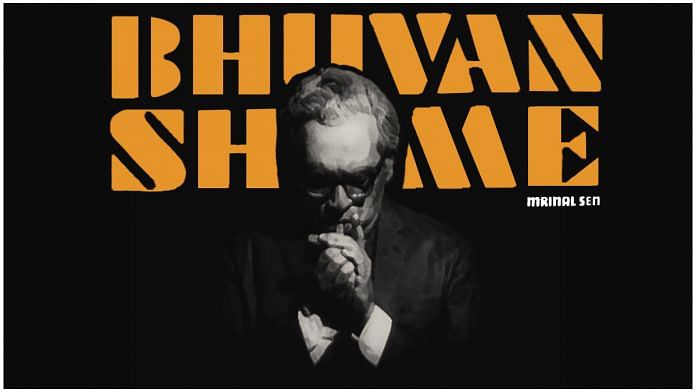The thing about Bhuvan Shome is that actually, very little happens. In terms of its actual plot, the 96-minute Hindi movie, adapted from a Bengali story by Banaphool, could easily be a 20-minute short film. But then it wouldn’t be the classic it is, the movie that pioneered an entire cinematic movement.
The 1969 movie about a lonely, upright, uptight railways employee roughly in his 50s, who goes on an absurd bird-hunting trip to Saurashtra and meets a much younger local woman who forces him to question himself and his ways, came as a breath of fresh air not only to India in general, but specifically to its maker. Director and producer Mrinal Sen had a rather rocky start in cinema, with a number of Bengali films that failed and some that did only moderately well. But it was with his Hindi film debut, Bhuvan Shome, which went on to win three National Awards, that he, in no uncertain terms, arrived and made it clear was here to stay.
The New Wave hit that gave Amitabh Bachchan his break
The movie, Sen’s first foray into the vastly different territory of Hindi films, was an unlikely success. It didn’t have a big budget, it had no big stars and it doesn’t follow a particularly structured format — there are long scenes of practically nothing happening that jump to other similar scenes without warning, and animation and freeze-frames are used liberally. It was not something Indian audiences were used to, but Mrinal Sen, enamoured as he was of the French Nouvelle Vague (New Wave) films of Francois Truffaut and suchlike, was adamant.
And he obviously knew what he was talking about because, as he has often recalled, sometime after the film’s release in Bombay, he was sitting in a cab with a fairly chatty driver. Sen asked him if he had seen the film Bhuvan Shome, assuming, perhaps, that he had not, and that this would get him to stay quiet. But the driver responded, “The film with the birds?” And when Sen said yes, he responded that it was “top-class”. When Sen identified himself, the driver shook his hand, stayed silent the rest of the ride and refused to take money from the filmmaker.
Also read: Mrinal Sen, the cinematic genius who had the courage to bring social realities on celluloid
One of the earliest movies to get funding from the Film Finance Corporation, the movie was widely known to have pioneered the New Wave of Indian cinema, with all its realism and naturalism. It also, strangely enough, launched the movie career of someone who now symbolises the exact opposite of realism, the epitome of hyper-improbable Bollywood masala movies: Amitabh Bachchan.
Yes, the superstar who is synonymous with some of Bollywood’s most action-packed, melodramatic musicals actually made his debut as the wryly observant narrator of the unassuming, quiet Bhuvan Shome, in which the title role was played by Bengali actor Utpal Dutt. (Later that year, Bachchan made his on-screen debut in Saat Hindustani, which also starred Dutt.)
Bhuvan’s loneliness, self-isolation and social distancing
Today, Utpal Dutt is an actor who defies every superlative, but back then, he was well known largely in theatre circles for his Shakespeare performances and his Leftist Bengali scripts. He became a household name thanks to his nuanced, delicate, touchingly comic portrayal of the rule-bound, curmudgeonly Bhuvan Shome transformed by his trip to the hinterland and his interaction with a local woman, Gauri (Suhasini Mulay in her debut). During their time spent together while he amateurishly tries to shoot birds, Bhuvan learns, instead, how to laugh, relax and be comfortable in his surroundings.
The birds are a recurring motif in the movie, their easy flight the perfect foil to Bhuvan’s stiff, arrogant manner. The fact that they fly in flocks also stands in stark contrast to Bhuvan’s lonely life, which is shown to us through an animation sequence of repetitive isolation. Watching this movie during a national lockdown, while actually practising self-isolation and social distancing because of the coronavirus crisis, one is struck by the odd irony. Here we are, alone at home, aching to meet our families and friends but knowing that staying away is our duty. And here is this man actually choosing to drive away everyone in his life.
On this weekend of Utpal Dutt’s 91st birth anniversary, watch Bhuvan Shome not only for the pioneering example of cinema it is, but also for its strangely beautiful depiction of a different kind of loneliness.
Also read: Soumitra Chatterjee, the Bengali legend you probably haven’t heard of but should




Utpaldutt was outstanding.. I have only watched yesterday, amid lockdown.. Everything,the music,photography, locales,in right place. Last scene of utpaldutt after relieving Patel’s charges and dancing is quite amusing.what could have been a documentary turned out to be, one of the best pictures in Hindi.
I would like to contribute articles to the print. Can I?